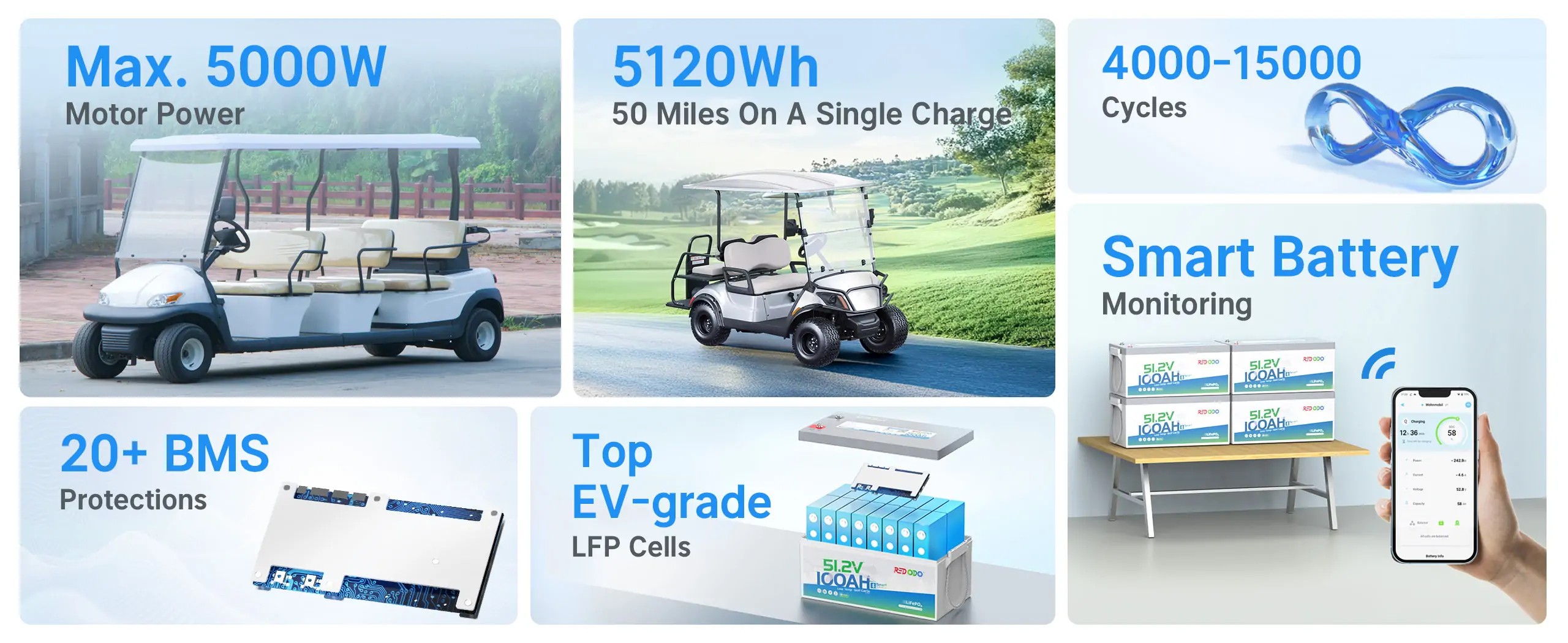Electric golf carts are growing in popularity not just on golf courses, but also in neighborhoods and recreational areas. As more and more people make the switch to modern lithium-powered models, one frequent question is: How long do 48 volt lithium golf cart batteries last?
In this article, we’ll take a closer look at the lifespan of 48 volt golf cart batteries, including lithium and lead-acid types, and share tips to help you maximize the performance and value of your golf cart batteries.
Table of Content
Understanding Golf Cart Battery Lifespan
When talking about battery lifespan, we consider two major factors:
- Cycle Life – how many full charge/discharge cycles a battery can endure before capacity diminishes.
- Years of Use – how many years you can expect a battery to last under normal usage.
The lifespan of a golf cart battery largely depends on the battery type. Compared to traditional lead-acid batteries, lithium batteries, especially Lithium Iron Phosphate (LiFePO4) batteries, offer a longer cycle life.
Most lithium batteries offer 3000 to 5000 life cycles, which translates to 8 to 10 years with proper care. A high-quality 48V lithium battery, such as Redodo 48V lithium golf cart batteries, can deliver over 4,000 full charge and discharge cycles and last up to 10 years of lifespan. In contrast, standard lead-acid batteries usually last only 200-500 cycles (2 to 3 years) and require frequent replacement.
Lead-Acid vs. Lithium Golf Cart Battery: A Lifespan Comparison
| Battery Type | Average Cycles | Expected Lifespan |
|---|---|---|
| Lead-Acid | 200–300 | 2–3 years |
| AGM | 300–500 | 3–4 years |
| LiFePO4 (Lithium) | 3,000–5,000 | 8–10 years |
This longevity is a game changer, especially for frequent users or fleets. With fewer replacements needed over time, lithium batteries are a cost-effective and hassle-free upgrade.

How Long Do 48 Volt Golf Cart Batteries Last on a Single Charge?
On average, with a fully charged 48V lithium battery, most golf carts can travel 25 to 40 miles per charge, depending on several factors:
- Battery types: Lithium batteries tend to have a higher range compared to lead-acid counterparts.
- Battery capacity (Ah rating): Higher capacity means longer range.
- Cart load: Heavier loads reduce range.
- Terrain: Hilly or uneven terrain drains more power.
- Speed & driving habits: Aggressive driving shortens runtime.
- Weather conditions: Cold weather may reduce battery efficiency.
The Redodo 48V 100Ah lithium golf cart battery delivers a range of up to 50 miles on a single charge, making it an ideal choice for users who need extended runtime and reliable performance.
Read More: How Long Does a 100Ah Battery Last in a Golf Cart
What Affects the Lifespan of a 48V Lithium Golf Cart Battery?
Although lithium batteries are engineered for durability, several factors influence how long they actually last:
1. Battery Quality
Not all lithium batteries are created equal. Premium models use EV-grade LiFePO4 cells, which are more stable and longer-lasting than budget alternatives. A robust BMS is also crucial for protecting the battery from overcharging, deep discharging, overcurrent, short-circuit, and overheating.
2. Charging Behavior
- Use the correct charger designed for lithium batteries.
- Avoid deep discharges (below 20%) regularly.
- Don’t leave batteries at 0% or 100% for long periods.
- Allow the battery to cool down after use before charging.
3. Usage Conditions
Extreme heat or freezing temperatures can reduce cycle life. For example, using batteries in very hot climates without proper ventilation can stress the cells.
4. Storage Practices
If your golf cart is stored for months, store the battery at about 50% charge, in a cool and dry location, and disconnect it from the system. Avoid storing it fully charged or fully depleted.
Tips to Extend the Life of Your Lithium Golf Cart Battery
To maximize both lifespan and performance:
- Bluetooth Monitoring: Use a Bluetooth battery monitor or App to track voltage, temperature, charge cycles, and more.
- Follow the 20–80 Rule: Keep your battery between 20% and 80% most of the time for optimal health.
- Use Right Chargers: Always use a lithium battery charger not a regular charger to charge your lithium batteries.
- Avoid High Discharge Loads: Don’t overload the cart or add accessories beyond battery specs.
48V Lithium vs. 48V Lead-Acid in Golf Carts
In addition to lifespan, the 48V lithium battery and 48V lead-acid battery for golf cart differ significantly in many terms like charging time, range, and weight.
1. Charging Time
- Lithium: Charges 3–5 times faster, typically 2–4 hours for a full charge using a proper lithium charger, allowing quicker turnaround and more frequent use.
- Lead-Acid: Requires 8–10 hours or more to fully charge, especially after deep discharges.
2. Ranges
- Lithium: A 48V lithium golf cart battery can provide 40-50 miles of range on a single charge, depending on capacity and terrain. Voltage remains stable, delivering full power until the battery is nearly empty.
- Lead-Acid: A 48V lead-acid battery typically offers 15–20 miles per charge. Power output decreases as the charge level drops rapidly, resulting in sluggish performance.
3. Weight and Efficiency
- Lithium: 50–70% lighter than lead-acid, reducing overall cart weight. This improves efficiency, acceleration, and reduces wear on tires and suspension.
- Lead-Acid: Heavier than lithium, which negatively impacts speed and range, and adds stress to the vehicle.
4. Maintenance Requirements
- Lithium: Zero maintenance. No water top-ups, corrosion cleaning, or equalization charging required. Ideal for users who want a hassle-free experience.
- Lead-Acid: Requires regular maintenance, especially for a Flood lead-acid, including water refilling, corrosion prevention, and monitoring to avoid sulfation.
5. Cost Over Time
- Lithium: Higher upfront cost, but lasts 2–3 times longer, with fewer replacements and lower energy loss during charging (up to 95% efficiency).
- Lead-Acid: Lower initial cost, but frequent replacements and lower energy efficiency (70–80%) make them more expensive over time.
6. Safety and Technology
- Lithium: Modern lithium batteries include an integrated Battery Management System (BMS) to ensure safety and offer upgraded functions like Bluetooth monitoring.
- Lead-Acid: They are generally safe because of their internal chemistry, but not support modern safety features or performance enhancements.
Are Lithium Golf Cart Batteries Worth the Investment?
Absolutely. While they may cost more upfront than lead-acid batteries, the long-term savings are significant. Here’s why:
- You won’t need to replace the battery every few years.
- Reduced electricity costs due to faster, more efficient charging.
- Lighter weight means better cart performance and less wear on tires and suspension.
- Virtually no maintenance.
Over a 10-year period, a lithium battery setup can save you costs in replacement and maintenance costs compared to lead-acid.
Related Reading: How Much Does it Cost to Replace Golf Cart Batteries
Final Thoughts
In summary, a well-maintained 48V lithium golf cart battery can last 8–10 years or 3,000–5,000 cycles at 100% fully discharge cycle. On a full charge, a single range of 48V golf cart batteries is 25–40 miles, depending on terrain and usage. Lithium batteries offer significantly longer life, better efficiency, and lower maintenance than lead-acid batteries.
If you're looking for a dependable, long-term solution for powering your golf cart, lithium is undoubtedly the superior choice. The initial investment pays off with better performance, lower total ownership costs, and fewer battery replacements.
Redodo offers advanced 48V lithium golf cart batteries built with EV-grade LiFePO4 cells, smart BMS protection, and Bluetooth monitoring for real-time battery data. Explore Redodo one-stop 48V golf cart lithium battery conversion kit to replace your old lead-acid setup or upgrade for more power and range.

Redodo

Redodo
Recent Post

12V 100Ah Battery vs 24V 100Ah Battery: Which is Better?

How Long Do 48 Volt Lithium Golf Cart Batteries Last?

What is the Best Lithium Battery for Trolling Motor?

How Long Does a 100Ah Battery Last in a Golf Cart?




![⚡[$975 Only] Redodo 48V 100Ah Bluetooth Golf Cart Lithium Battery Conversion Kit | For Club Car, EZGO, ICON, Yamaha](http://www.redodopower.com/cdn/shop/files/Redodo_51.2V_100ah_golf_cart_lithium_battery.webp?v=1744708779)

![⚡[$517 Only] Redodo 12V 300Ah Lithium LiFePO4 Battery | Replaces 6*12V 100Ah AGM Batteries | RV, Marine, Solar](http://www.redodopower.com/cdn/shop/files/Redodo_12V_300ah_lithium_deep_cycle_battery.png?v=1744797523)
![⚡[$385 Only] Redodo 12V 200Ah Lithium LiFePO4 Battery | 1280W Load Power | For RV, Solar, Off-Grid](http://www.redodopower.com/cdn/shop/files/Redodo12V200ahlithiumbattery.jpg?v=1735892910)

![⚡[$216 Only] Redodo 12V 100Ah Group 24 Deep Cycle LiFePO4 Lithium Battery | For Home, RV, Marine](http://www.redodopower.com/cdn/shop/files/Redodo_12V_100Ah_group_24_lithium_battery_6301965d-f6e8-467f-825f-3eec839b3e1f.jpg?v=1744105344)
![⚡[$276 Only] Redodo 12V 140Ah Group 31 Lithium Battery with Bluetooth | 40% More Capacity | For RV, Marine, Solar Home](http://www.redodopower.com/cdn/shop/files/Redodo_12V_140ah_bluetooth_battery_ee6d5fd1-5c7d-4b9a-90ab-d54d06b29a04.jpg?v=1742967763)